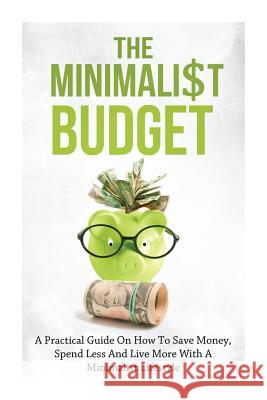The Minimalist Budget: A Practical Guide On How To Save Money, Spend Less And Live More With A Minimalist Lifestyle » książka
The Minimalist Budget: A Practical Guide On How To Save Money, Spend Less And Live More With A Minimalist Lifestyle
ISBN-13: 9781500713508 / Angielski / Miękka / 2014 / 98 str.
The Minimalist Budget: A Practical Guide On How To Save Money, Spend Less And Live More With A Minimalist Lifestyle
ISBN-13: 9781500713508 / Angielski / Miękka / 2014 / 98 str.
(netto: 49,37 VAT: 5%)
Najniższa cena z 30 dni: 51,12
ok. 16-18 dni roboczych.
Darmowa dostawa!
What's the first thing you think of when you hear the word "budget"?
It's a meager little word, one that all too often comes after "tight".
Maybe you think of this word as an adjective, something to describe a cheap and substandard car or hotel. "Budget" brings to mind rationing... a kind of money diet.
If you're like many people, budgeting is something you do with a kind of deflated spirit: budgeting means bargain bin quality and the sad sense that what you want is going to be just out of reach.
This book will try a different approach to budgeting altogether...
It's a pity that the idea of living within one's means should be experienced as such a deficit - this book will try to show that when you apply the principles of minimalism to budgeting, you are neither in a state of self-denial or trying to survive a financial scrape. In fact, a minimalist budget is a particular approach to abundance and fulfillment that may seem counter-intuitive to most.
This book will offer an expanded notion of what it means to budget. We'll look at how money is not the only resource that needs to be managed, and a "life budget" that acknowledges your emotional, behavioral, social and even spiritual capital is more likely to lead to smarter decisions.
We'll explore shopping and spending habits, identify problem areas, think about debt and make achievable goals for home, work and more. We'll look at concrete ways to put some of these principles into action, and look at resources that will keep you focused and motivated.
At the same time, this book is also about the philosophy of minimalism, not thriftiness. If you can pair your budget plan with a more nuanced understanding of your relationship with money and how it ties into how you want to live, the changes you make will be more authentic and longer lasting.
Minimalism is not about doing with less than you need. Rather, it's about finding what you need and fulfilling that need exactly, without excess. It's a subtle and easily overlooked point: to have exactly enough is not suffering. Budgeting is therefore about understanding what you need to have enough, and how best you can allocate your resources to that end.
Life is short. Money and material things can make our time on this earth better, and they can help us move closer to what we find meaningful and worthwhile. But they are not meaningful and worthwhile in themselves. Money is a tool and how we spend it is an expression of our values and what we think is important.
How much would you pay for peace of mind and the calm you get from knowing you are living well? How much of your life do you give away when you work? Of all your expenses, have you remembered to include the time you waste stressing about money? These may seem like vague or overly philosophical questions, but they get to the root of how we earn, spend and think of money. Once we understand these roots, our efforts to save here and there not only become easier, they become more meaningful.
WHAT ARE READERS SAYING?
"This is definitely not just another cut-and-save type of book. While it does deliver a wealth of very solid advice on how to make drastic changes in your spending habits and provide great advice on how to save money in an variety of areas, it gave me so much more food for thought that I could ever have anticipated. This book ties all of the above into our own personal psychology and our attitudes about money, possessions and the role they play in our lives. The next time someone asks for advice on this topic, I will definitely recommend this book."
Grab your copy TODAY
Zawartość książki może nie spełniać oczekiwań – reklamacje nie obejmują treści, która mogła nie być redakcyjnie ani merytorycznie opracowana.











